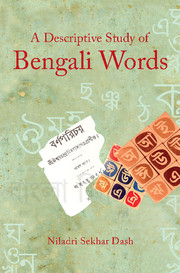Book contents
- Frontmatter
- Dedication
- Contents
- List of Tables
- Bengali Vowel Sounds in Cardinal Diagram
- Preface
- Acknowledgements
- Chapter I Word: A Conceptual Complexity
- Chapter II Usage of Some Word-formative Elements in Bengali
- Chapter III Frequency of Use of Words in Bengali
- Chapter IV Structural Components of Bengali Words
- Chapter V Use of Affixes with Bengali Words
- Chapter VI Postpositions Used in Bengali
- Chapter VII Compound Nouns and Adjectives
- Chapter VIII Structure of Reduplicated Forms in Bengali
- Chapter IX Lexical Naturalization in Bengali
- Appendix I
- Appendix II
- Appendix III
- Appendix IV
- Appendix V
- Appendix VI
- Appendix VII
- Bibliography
- Author Index
- Subject Index
Chapter VII - Compound Nouns and Adjectives
Published online by Cambridge University Press: 18 December 2014
- Frontmatter
- Dedication
- Contents
- List of Tables
- Bengali Vowel Sounds in Cardinal Diagram
- Preface
- Acknowledgements
- Chapter I Word: A Conceptual Complexity
- Chapter II Usage of Some Word-formative Elements in Bengali
- Chapter III Frequency of Use of Words in Bengali
- Chapter IV Structural Components of Bengali Words
- Chapter V Use of Affixes with Bengali Words
- Chapter VI Postpositions Used in Bengali
- Chapter VII Compound Nouns and Adjectives
- Chapter VIII Structure of Reduplicated Forms in Bengali
- Chapter IX Lexical Naturalization in Bengali
- Appendix I
- Appendix II
- Appendix III
- Appendix IV
- Appendix V
- Appendix VI
- Appendix VII
- Bibliography
- Author Index
- Subject Index
Summary
Introduction
Compounding is one of the most fertile ways of word formation in Bengali. It is noted that in Bengali new compound words are quite often generated by combining two or more words or stems following the word formation rules and strategies applicable in the language to meet the linguistic needs of the language. In my view, the process of compounding is perhaps the most versatile method of word formation in Bengali, which contributes in a highly fruitful manner to increase the vocabulary of the language.
Keeping the observations made by earlier scholars in sight as well as taking all the questions into consideration, in this chapter, I have made an attempt to present a systematic discussion on strategies and methods adopted in compound words formation in modern Bengali with regard to the changes that take place in the original structures of the constituent words. I have also tried to analyse the surface form of Bengali compound words to show how the formative members are combined together to generate the final forms; if there is a morphophonemic process that underlies this operation; and if the semantic load of the formative members is affected at the time of combining words for generating compounds. To accomplish these goals, I have analysed a large number of compound words retrieved meticulously from the Bengali text corpus database, which is very rich with various types of compound words marked with different forms and meanings. In a step-by-step process, I have discussed various approaches proposed by earlier scholars for treating compound words; referred to some of the earlier studies on Bengali compounds; identified the types of Bengali compounds; defined the form and structure of compound nouns and adjectives: and discussed the concept of headedness with regard to Bengali compound words available in the language.
Approaches for treating compounds
For a long time now, scholars have studied the process of formation of compound words with utmost interest and curiosity. However, most of these studies are primarily descriptive in nature with rare emphasis on formal and generative aspects of compounds.
- Type
- Chapter
- Information
- A Descriptive Study of Bengali Words , pp. 195 - 224Publisher: Cambridge University PressPrint publication year: 2015



